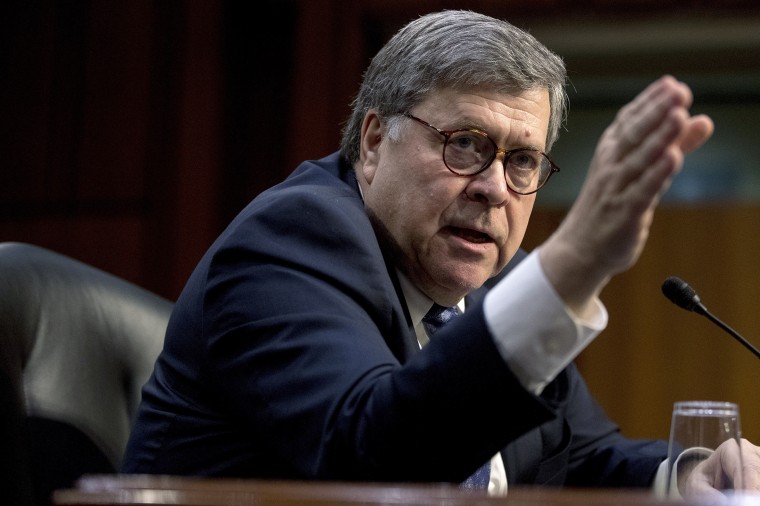The Senate voted Thursday to approve William Barr as the next attorney general and successor to Jeff Sessions, who stepped down in November. Now, the pressing question is what the country can expect from its new top law enforcement official: a continuation of Sessions' hard-line stance on immigration and crime, or a new course?
The answer is most likely some of both.
Barr, who previously served as attorney general under the first President Bush, has embraced positions on immigration and crime that were also backed by Sessions, a former federal prosecutor and U.S. senator from Alabama.
But the two men are not identical in their views, said John Malcolm, vice president of the Institute for Constitutional Government at the conservative Heritage Foundation. He has studied Barr's record and watched his January confirmation hearing before the Senate Judiciary Committee. "There was a dogmatic quality to Jeff Sessions' approach, and I think Barr will be more open-minded," Malcolm said.
So far, questions about Barr's plans have centered on special counsel Robert Mueller's ongoing investigation into Russian meddling in the 2016 election. Sessions recused himself from overseeing the investigation, angering President Donald Trump. Barr has said Sessions did the right thing.
But Barr's impact on the criminal justice system will be wide-ranging. Here's what we know so far about his views on three key issues:
A hard line on immigration
Barr has taken uncompromising positions on immigration, and experts say they don't expect that to change.
During Barr's first term as attorney general, from 1991 to 1993, he made it harder for asylum-seekers to enter the United States. He sent immigration officers to foreign airports to screen people before they boarded planes to America. And he blocked Haitians fleeing a 1991 coup, arranging for them to be detained at Guantánamo Bay, Cuba, and screened for HIV and AIDS before they could claim asylum at the U.S. border.
More recently, while in private law practice, Barr has defended Trump's travel ban that primarily affected Muslim countries. He also praised Sessions' ramping up prosecutions of people trying to re-enter the country after being deported.
"We need money right now for border security, including barriers and walls and slats and other things," Barr said at his January confirmation hearing.
Those statements indicate Barr won't depart much from Sessions, who played a guiding role in the Trump administration's efforts to curtail immigration.
Sessions made it tougher for migrants to seek asylum, forced immigration judges to speed up deportation hearings, enforced a "zero tolerance" border policy that included separating migrants from their children, and helped Trump craft new versions of the travel ban after it was blocked in the courts.
A new 'openness' to criminal justice reform
Barr has historically supported mandatory minimum sentences and other tough-on-crime policies. But he may soften.
As attorney general, Barr released a report in 1992 called "The Case for More Incarceration" as a plan to control soaring crime rates. It became a template for policies that fed mass incarceration and reflected Barr's long-standing attitudes on law and order.
Even as those views grew less popular, Barr held onto them.
In 2015, he joined dozens of former law enforcement officials fighting a proposal that would have rolled back some mandatory-minimum sentences, among other reforms. By then, research had shown that punitive policies such as mandatory minimums tore families apart and left millions unable to get steady work, find housing or vote. But Barr and the other former officials said they worked. "Our system of justice is not broken," the former officials wrote.
Sessions held similar ideas about crime fighting. He resisted reforms and rescinded Obama administration memos that called for leniency for low-level drug offenders.
After Sessions resigned in November, Barr and two other former attorneys general wrote an op-ed in The Washington Post praising those moves and "a job well done."
A few weeks later, Congress passed — and Trump signed into law — the First Step Act, a criminal justice reform measure that eased harsh mandatory minimum sentences. At Barr's January confirmation hearing, senators questioned his commitment to upholding that law. Barr said that he still saw those earlier policies as effective, but he also indicated he was open to different approaches.
"I have no problem with the approach of reforming the sentencing structure and I will faithfully enforce that law," Barr said.
Marc Levin, a vice president of the conservative Texas Public Policy Foundation, said Barr displayed "an openness to rethinking specific policies based on evidence and changes in circumstances, that I didn't see in Sessions."
A more flexible view on marijuana
Like Sessions, Barr is against marijuana legalization. But the new attorney general has indicated that he isn't interested in going after marijuana growers and distributors in states that allow the drug.
That would be a change from Sessions, who reversed an Obama administration policy that allowed the pot industry to operate in states that have decriminalized the drug. The move gave federal prosecutors approval to bring charges against pot growers and distributors under federal law, which still says marijuana is illegal.
While no such prosecutions have happened, they remain a possibility, so Barr's views will be key. In January, he told the Senate Judiciary Committee that he wouldn't go after marijuana companies in states that have legalized it.
That apparent flexibility reflects the difference in political drive between Sessions, who was one of the Senate's far-right members, and Barr, who has never held elected office or served as a prosecutor on a case in court, said Brett Tolman, a former U.S. attorney in Utah who is now a criminal defense lawyer.
"I think Barr is being sensitive to states that have legalized marijuana and sees the need to balance it," Tolman said.

